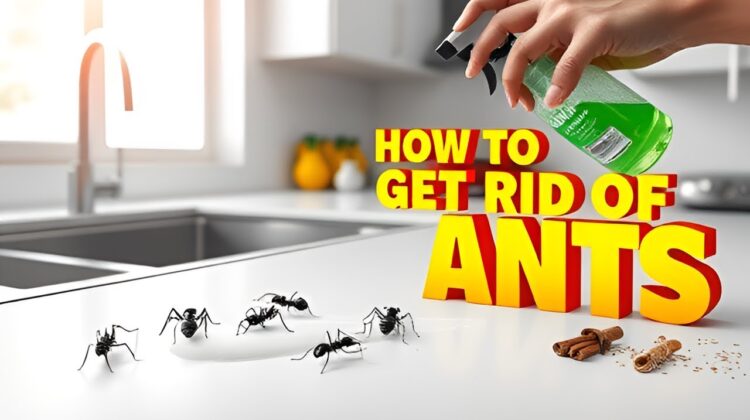
Ants are among the most persistent household pests, often appearing in kitchens, gardens, and even inside walls. While they play an essential role in nature by aerating soil and controlling other insect populations, they can become a nuisance when they invade homes. Instead of using harmful chemical pesticides, you can get rid of ants naturally with simple, effective methods.
This guide will explore different types of ants, why they infest homes, and the best natural solutions to deter or eliminate them.
Understanding Ant Infestations
Before tackling an ant problem, it’s important to understand why they invade homes and gardens.
Why Do Ants Invade Homes?
Ants enter homes primarily in search of food, water, and shelter. The most common attractants include:
- Food crumbs and spills – Especially sugary and greasy foods.
- Standing water – Leaky pipes or pet water bowls.
- Unsealed trash bins – Food waste attracts foraging ants.
- Cracks and crevices – Ants use tiny openings to enter homes.
Types of Ants Commonly Found Indoors
- Black Garden Ant (Lasius niger) – The most common species, often seen trailing to food sources.
- Pharaoh Ant (Monomorium pharaonis) – A tiny, yellowish-brown ant that infests kitchens and bathrooms.
- Carpenter Ant (Camponotus spp.) – Large black ants that nest in wood, potentially damaging structures.
- Fire Ant (Solenopsis invicta) – Reddish ants known for painful stings, mostly found in outdoor areas.
How to Get Rid of Ants Naturally
1. Identify and Eliminate Food Sources
- Wipe down kitchen counters and tables after meals.
- Store food in airtight containers.
- Sweep floors and vacuum crumbs regularly.
- Empty trash bins frequently and keep lids sealed.
2. Block Entry Points
- Seal cracks and gaps around windows, doors, and foundations.
- Use weather stripping on doors to prevent entry.
- Repair any leaking pipes to eliminate water sources.
3. Natural Remedies to Deter Ants
a) Vinegar Spray
How to Use:
- Mix equal parts of white vinegar and water in a spray bottle.
- Spray on ant trails, entry points, and kitchen surfaces.
Why It Works:
Vinegar disrupts the ants’ scent trails, making it difficult for them to navigate.
b) Lemon Juice
How to Use:
- Squeeze fresh lemon juice along windowsills, doorways, and cracks.
- Wipe down surfaces with diluted lemon juice.
Why It Works:
The acidic nature of lemon confuses ants and masks their pheromone trails.
c) Essential Oils (Peppermint, Tea Tree, or Lavender)
How to Use:
- Mix 10 drops of essential oil with a cup of water.
- Spray in areas where ants are active.
Why It Works:
Strong essential oil scents repel ants and disrupt their communication.
d) Cinnamon Powder
How to Use:
- Sprinkle ground cinnamon along entry points and affected areas.
Why It Works:
Cinnamon’s strong scent interferes with ants’ ability to follow scent trails.
e) Diatomaceous Earth (Food-Grade)
How to Use:
- Lightly dust around baseboards, windows, and ant nests.
Why It Works:
Diatomaceous earth dehydrates and kills ants upon contact.
f) Boric Acid and Sugar Bait
How to Use:
- Mix 1 part boric acid with 3 parts sugar and add water to form a paste.
- Place small amounts near ant trails in bottle caps.
Why It Works:
Ants carry the toxic bait back to their colony, eliminating the entire nest.
g) Coffee Grounds
How to Use:
- Sprinkle used coffee grounds around outdoor areas where ants are present.
Why It Works:
The strong smell of coffee repels ants and disrupts their trails.
h) Chalk or Talcum Powder
How to Use:
- Draw a chalk line or sprinkle talcum powder around entry points.
Why It Works:
Chalk and talcum powder interfere with ants’ scent trails, preventing them from entering.
How to Get Rid of Ants in the Garden
While ants can benefit gardens by aerating soil and preying on pests, excessive infestations can harm plants.
1. Relocate Ant Nests
If ants are nesting in garden pots or flower beds, try:
- Flooding the nest with water to encourage relocation.
- Placing cucumber peels near nests, as ants dislike their scent.
2. Protect Plants from Ant Damage
- Wrap plant stems with sticky tape to prevent ants from climbing.
- Encourage natural predators like ladybugs to reduce aphids (which attract ants).
3. Use Natural Outdoor Barriers
- Create a border of diatomaceous earth or coffee grounds around garden beds.
- Grow ant-repelling plants like mint, rosemary, or lavender.
Preventing Future Infestations
The best way to get rid of ants is to prevent them from returning. Follow these long-term prevention tips:
✔ Keep your home clean – Regularly sweep and mop floors, wipe surfaces, and store food properly.
✔ Seal cracks and entry points – Close gaps around doors, windows, and plumbing.
✔ Use natural deterrents – Continue using vinegar sprays or essential oils regularly.
✔ Control outdoor ant populations – Manage garden conditions to prevent excessive ant nesting.
Conclusion
Getting rid of ants naturally is simple and effective with the right methods. By removing food sources, sealing entry points, and using natural deterrents, you can keep your home and garden ant-free without harmful chemicals.
Adopt these eco-friendly solutions today and enjoy a pest-free environment while protecting nature’s balance!
Benefits of Eating Dates Every Day – Discover why dates are a nutritious and delicious addition to your diet.
Leave a Reply